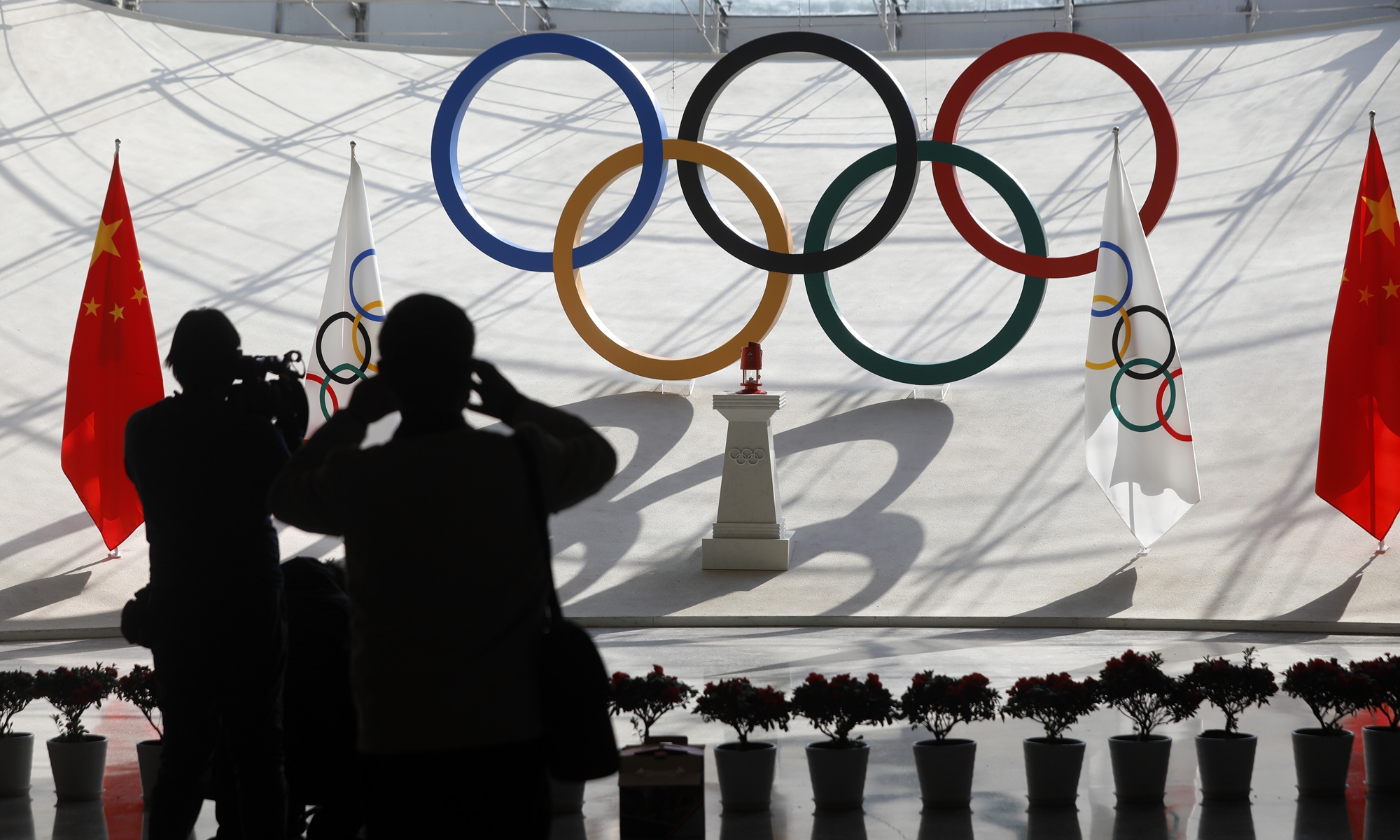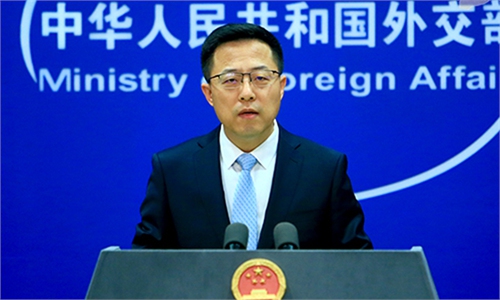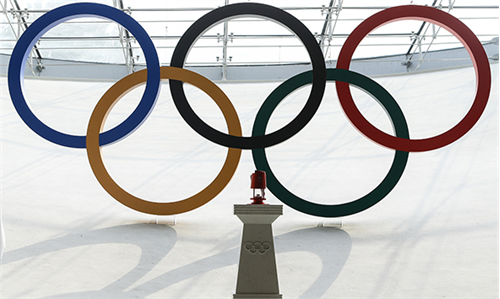'Diplomatic boycott' of Beijing Winter Olympic Games exposes the US' lies of 'Uygur genocide'

Visitors take pictures of the flame of the Beijing 2022 Winter Olympic Games displayed at the Olympic Tower near the “Bird’s Nest” National Stadium in Beijing on October 23, 2021. Photo: VCG
The US decided to impose a "diplomatic boycott" to the upcoming Beijing Winter Olympic Games according to what it says is the alleged "genocide" of the Uyghurs in China's Xinjiang Uyghur Autonomous Region. Australia also announced that they will do the same, and it is possible that other vassals of the US could follow its lead as well. Liu Pengyu, spokesman for the Chinese Embassy in the US, said that no invitation has been extended to US politicians whatsoever, so this 'diplomatic boycott' simply comes out of nowhere.
Meanwhile, Chinese Foreign Ministry spokesperson, Wang Wenbin, commented on Australia's decision on Wednesday, saying that "Australian politicians' political stunt for selfish gains has no impact whatsoever on the Olympics to be successfully held by Beijing." He also mentioned that the Australian practice gravely violates the principle of political neutrality enshrined in the Olympic Charter.
There is more to it than just that, though. In fact, it can be argued that these "diplomatic boycotts" are counterproductive for the US' information warfare campaign alleging that China is carrying out a so-called "genocide" in Xinjiang. The US itself does not truly believe what it says. If it did, then it would have decided to do a total boycott of the Games by denying its athletes the right to participate in them. After all, genocide is a very serious accusation and no responsible country would support others who do it.
Nevertheless, by only denying its diplomats the right to attend, who, to be clear, were never invited by China in the first place, the US is really only carrying out a partial or symbolic boycott. Those countries that are being targeted by the US' weaponized narrative alleging that a "genocide" is happening in Xinjiang should take note of this curious move. It very strongly suggests to any objective observer that the US doesn't truly believe its own words as was just explained.
This should lead them to question the credibility of everything else that the US has said about China, from the similarly false allegations that Huawei is supposedly spying on its customers to the equally fake claims that China engages in so-called debt trap diplomacy. If the US does not even believe its most serious accusation against China, that it is allegedly committing genocide against the Uyghurs, then one must reasonably suspect that it also does not believe any of its lesser claims either.
In other words, everything negative that the US has said about China all these years was nothing but information warfare designed to discredit China's international reputation and deter its dozens of partners across the world from cooperating with it. Basically, it was nothing but lies, as evidenced by the fact that the US will not even impose a total boycott of the upcoming Winter Olympic Games despite its very serious but ultimately unsubstantiated claim that China is committing "genocide" against the Uyghurs.
Building upon this observation, it can also be extrapolated that US diplomats do not have the international reputation that some have attributed to them. If they were truly among the best in their field, they would surely have foreseen that their partial diplomatic boycott would lead others to question the credibility of their genocide accusation against China. Therefore, it can be concluded that their reputation is undeserved and their professional qualifications are not equal to that of other major countries.
There is some more insight that can be shared from this incident as well, particularly concerning Australia's decision to follow the US' lead. It is well known that Australia has regional ambitions that far outweigh its capabilities. Yet, its leaders believe that it can nonetheless advance them by voluntarily surrendering their sovereignty and becoming their American ally's vassal. This explains why it is locked with the US on all of Washington's anti-Chinese policies.
There might be other countries within the US' global network of vassal states that either share similarly unrealistic regional ambitions as Australia or are even less sovereign and could simply be pressured to comply with America's demands. Hopefully no more countries will follow the "diplomatic boycott" to the Winter Olympic Games because it is unfriendly and against the Olympic Spirit. However, those that do would be revealing their proxy servitude to their US patron.
It would have been best if the US and Australia did not manufacture their ridiculous drama by boycotting the upcoming Winter Olympic Games. But, since they did, the silver lining is that the world now knows that they do not truly believe Washington's lies about the alleged "genocide" in Xinjiang. Furthermore, Australia proved that it is just an American puppet, not an independent country in the real sense of the word. These are both very useful insights to dwell upon.
To conclude, US diplomats were so obsessed with reviving their lies about Xinjiang that they sloppily did so in the most counterproductive way possible through their "diplomatic boycott." They prompted the world to question the credibility of their false genocide claims. This outcome will have enormous implications for the US information warfare against China since it shows all objective observers that it was never anything but a bunch of lies.
The author is a Moscow-based American political analyst. opinion@globaltimes.com.cn

Visitors take pictures of the flame of the Beijing 2022 Winter Olympic Games displayed at the Olympic Tower near the "Bird's Nest" National Stadium in Beijing on October 23, 2021. Photo: VCG
The US decided to impose a "diplomatic boycott" to the upcoming Beijing Winter Olympic Games according to what it says is the alleged "genocide" of Uygur people in China's Xinjiang Uygur Autonomous Region. The other countries in the "Five Eyes" intelligence-sharing alliance apart from New Zealand also announced that they'll follow suit under the same pretext. Wellington won't send its diplomats, but it cited COVID-19 as the reason behind its decision. It's still possible for the US' other vassal states to follow in Australia and company's footsteps.
Liu Pengyu, spokesman for the Chinese Embassy in the US, said that no invitation has as yet been extended to US politicians, "so this 'diplomatic boycott' has simply come out of nowhere." Other diplomats condemned the copycat "diplomatic boycotts" by Australia, Canada, and the UK. The common message was that those decisions are a grave distortion of the Olympic Charter.
There is more to it than just that, though. In fact, it can be argued that these "diplomatic boycotts" are counterproductive for the US' information warfare campaign alleging that China is perpetrating a so-called "genocide" in Xinjiang. The US itself does not truly believe what it says. If it did, then it would have decided to do a total boycott of the Games by denying its athletes the right to participate in them. After all, genocide is a very serious accusation and no responsible country would support others committing it.
Nevertheless, by only denying its diplomats the right to attend, who, to be clear, were never invited by China in the first place, the US is really only carrying out a partial or symbolic boycott. The countries being targeted by the US' weaponized narrative alleging that a "genocide" is happening in Xinjiang should take note of this curious move. It very strongly suggests to any objective observer that the US doesn't truly believe its own words as was just explained.
This should lead them to question the credibility of everything else that the US has said about China, from the similarly false allegations levied against Huawei and its supposed spying on its customers to the equally fake claims that China engages in so-called debt trap diplomacy. If the US does not even believe its most serious accusation against China of acts of genocide perpetrated against Uygur people, then one must reasonably suspect that it also does not believe any of its lesser claims.
In other words, everything negative that the US has said about China all these years was nothing but information warfare designed to discredit China's international reputation and deter its dozens of partners across the world from cooperating with it. Basically, it was nothing but lies, as evidenced by the fact that the US will not even impose a total boycott on the upcoming Winter Olympic Games despite its very serious but ultimately unsubstantiated claim that China is committing "genocide" against Uygur people.
Building upon this observation, it can also be extrapolated that US diplomats do not have the international reputation that some have attributed to them. If they were truly among the best in their field, they would surely have foreseen that their partial diplomatic boycott would lead others to question the credibility of their claims regarding acts of genocide against China. Therefore, it can be concluded that their reputation is undeserved and their professional qualifications are not equal to those of other major countries.
There is some more insight that can be gleaned from this incident, particularly concerning other countries' decisions to follow America's lead. Some like Australia have regional ambitions that far outweigh their capabilities while others such as the UK are fading powers desperately searching for relevance. As for Canada, despite it finally releasing political hostage Meng Wanzhou in September, it obviously still seems to be the US' lackey as evidenced by its latest decision.
There might be other countries within the US' global network of vassal states that are either as eager to please their patron as is Australia or could easily be pressured by it to comply with America's demands for them follow suit like what seems to have happened to Canada. Hopefully no more countries will follow the pseudo-grandstanding posture of a "diplomatic boycott" to the Winter Olympic Games because it is counterproductive and against the Olympic Spirit. However, those that do would be revealing their proxy servitude to their US patron.
It would have been best if the US and proxies had not manufactured their ridiculous incredulity by boycotting the upcoming Winter Olympic Games. But since they did, the silver lining is that the world now knows that they do not truly believe Washington's lies about the alleged "genocide" in Xinjiang. Furthermore, those who followed its lead are now seen as American puppets, not independent countries in any real sense of the world. This is very useful insight.
In conclusion, US diplomats were so obsessed with reviving their lies about Xinjiang that they acted sloppily in the most counterproductive way possible through their "diplomatic boycott." They prompted the world to question the credibility of their false genocide claims. This outcome will have enormous implications for the US' information warfare against China since it shows all objective observers that it was never anything but a bunch of lies.
The author is a Moscow-based American political analyst. opinion@globaltimes.com.cn



